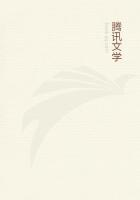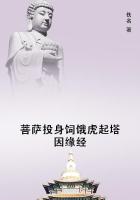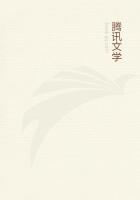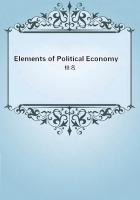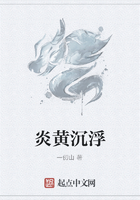There is not one of a thousand that is right and settled so much as one minute in a whole life, and that may not very well doubt, whether according to her natural condition she ever can be; but to join constancy to it is her utmost perfection; I mean when nothing should jostle and discompose her, which a thousand accidents may do. 'Tis to much purpose that the great poet Lucretius keeps such a clatter with his philosophy, when, behold! he goes mad with a love philtre. Is it to be imagined that an apoplexy will not stun Socrates as well as a porter? Some men have forgotten their own names by the violence of a disease; and a slight wound has turned the judgment of others topsy-turvy. Let him be as wise as he will, after all he is but a man; and than that what is there more frail, more miserable, or more nothing? Wisdom does not force our natural dispositions, "Sudores itaque, et pallorem exsistere toto Corpore, et infringi linguam, vocemque aboriri, Caligare oculos, sonere aures, succidere artus, Demque concidere, ex animi terrore, videmus."
["Sweat and paleness come over the whole body, the tongue is rendered powerless, the voice dies away, the eyes are darkened, there is ringing in the ears, the limbs sink under us by the influence of fear."--Lucretius, iii. 155.] he must shut his eyes against the blow that threatens him; he must tremble upon the margin of a precipice, like a child; nature having reserved these light marks of her authority, not to be forced by our reason and the stoic virtue, to teach man his mortality and our weakness; he turns pale with fear, red with shame, and groans with the cholic, if not with desperate outcry, at least with hoarse and broken voice:
"Humani a se nihil alienum putet."
[" Let him not think himself exempt from that which is incidental to men in general."--Terence, Heauton, i. 1, 25.]
The poets, that feign all things at pleasure, dare not acquit their greatest heroes of tears:
"Sic fatur lacrymans, classique immittit habenas."
["Thus he speaks, weeping, and then sets sail with his fleet."--Aeneid, vi. i.]
'Tis sufficient for a man to curb and moderate his inclinations, for totally to suppress them is not in him to do. Even our great Plutarch, that excellent and perfect judge of human actions, when he sees Brutus and Torquatus kill their children, begins to doubt whether virtue could proceed so far, and to question whether these persons had not rather been stimulated by some other passion.--[Plutarch, Life of Publicola, c. 3.]-- All actions exceeding the ordinary bounds are liable to sinister interpretation, for as much as our liking no more holds with what is above than with what is below it.
Let us leave that other sect, that sets up an express profession of scornful superiority --[The Stoics.]--: but when even in that sect, reputed the most quiet and gentle, we hear these rhodomontades of Metrodorus:
"Occupavi te, Fortuna, atque cepi: omnesque aditus tuos interclusi ut ad me aspirare non posses;"
[Fortune, I have got the better of thee, and have made all the avenues so sure thou canst not come at me."--Cicero, Tusc. Quaes., v. 9.] when Anaxarchus, by command of Nicocreon the tyrant of Cyprus, was put into a stone mortar, and laid upon with mauls of iron, ceases not to say, "Strike, batter, break; 'tis not Anaxarchus, 'tis but his sheath that you pound and bray so"; when we hear our martyrs cry out to the tyrant from the middle of the flame, "This side is roasted enough, fall to and eat, it is enough done; fall to work with the other;" when we hear the child in Josephus' torn piece-meal with pincers, defying Antiochus, and crying out with a constant and assured voice: "Tyrant, thou losest thy labour, I am still at ease; where is the pain, where are the torments with which thou didst so threaten me? Is this all thou canst do? My constancy torments thee more than thy cruelty does me. O pitiful coward, thou faintest, and I grow stronger; make me complain, make me bend, make me yield if thou canst; encourage thy guards, cheer up thy executioners; see, see they faint, and can do no more; arm them, flesh them anew, spur them up"; truly, a man must confess that there is some phrenzy, some fury, how holy soever, that at that time possesses those souls. When we come to these Stoical sallies: "I had rather be mad than voluptuous," a saying of Antisthenes. When Sextius tells us, "he had rather be fettered with affliction than pleasure": when Epicurus takes upon him to play with his gout, and, refusing health and ease, defies all torments, and despising the lesser pains, as disdaining to contend with them, he covets and calls out for others sharper, more violent, and more worthy of him;
"Spumantemque dari, pecora inter inertia, votis Optat aprum, aut fulvum descendere monte leonem:"
["And instead of timid beasts, wishes the foaming boar or tawny lion would come from the mountain."--AEneid, iv. 158.] who but must conclude that these are wild sallies pushed on by a courage that has broken loose from its place? Our soul cannot from her own seat reach so high; 'tis necessary she must leave it, raise herself up, and, taking the bridle in her teeth, transport her man so far that he shall afterwards himself be astonished at what he has done; as, in war, the heat of battle impels generous soldiers to perform things of so infinite danger, as afterwards, recollecting them, they themselves are the first to wonder at; as it also fares with the poets, who are often rapt with admiration of their own writings, and know not where again to find the track through which they performed so fine a Career; which also is in them called fury and rapture. And as Plato says, 'tis to no purpose for a sober-minded man to knock at the door of poesy: so Aristotle says, that no excellent soul is exempt from a mixture of madness; and he has reason to call all transports, how commendable soever, that surpass our own judgment and understanding, madness; forasmuch as wisdom is a regular government of the soul, which is carried on with measure and proportion, and for which she is to herself responsible. Plato argues thus, that the faculty of prophesying is so far above us, that we must be out of ourselves when we meddle with it, and our prudence must either be obstructed by sleep or sickness, or lifted from her place by some celestial rapture.

